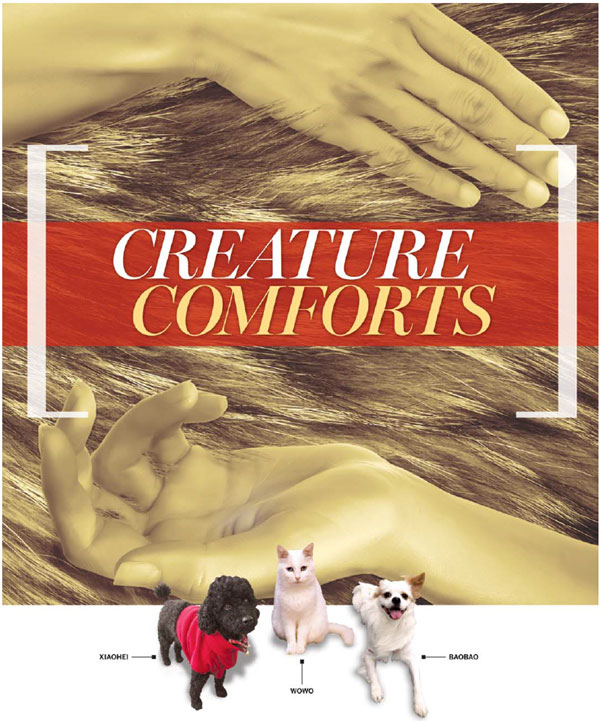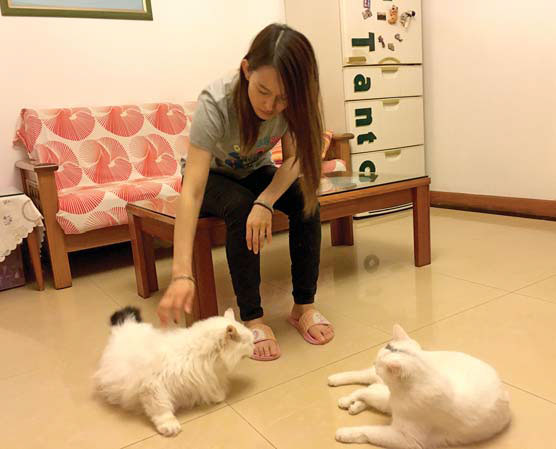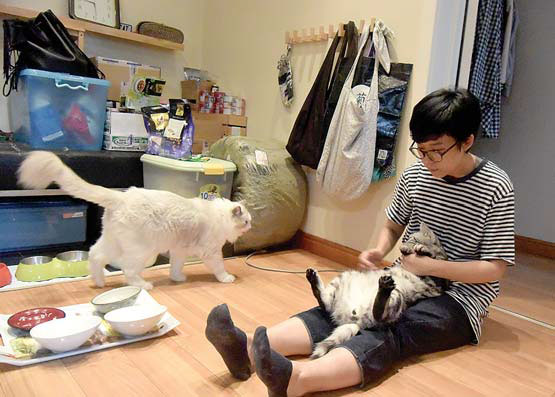Chinese growing closer to pets

Pampering animals more common among only children and empty nesters
A few months ago, I bumped into a friend in a Japanese restaurant. He ordered a bottle of sake and invited me to join him. When I told him I was going to get a cat, his jolly mood instantly turned somber.
"My dog died a week ago," he said numbly, as he held a cup of sake.

He recounts how he'd gotten the husky, how much he loved it, how it had waited until he had returned from a business trip before it died, how he had taken it to a veterinary clinic in a vain attempt to save its life, and how on a rainy night he had dug a grave for his departed friend.
I could tell he was trying to hold back tears; so was I.
Three years ago, Dandan, a 5-year-old dog my parents had, was knocked over and killed by a car. When they told me about how she had died, my mother - seldom one to shed tears in front of me - cried. My father tried to cover his sorrow by walking away.
In the absence of my brother and I, Dandan had been a most loyal companion to them, bringing much joy and comfort to their lives.
"He was a family member," my friend says of his husky. "I'd always wanted a dog since middle school. Finally, more than 10 years ago, my father gave it to me as a reward for gaining admission to a good university.
"He ate even better than me, all imported dog food, and I walked him twice a day if I was not away on business," he says, drinking another cup of sake. "My son loved him, and he loved my son, too."
I tried to console him.
"You gave him the best you could give. He was a happy dog, and a lucky one," I say, after which he started to perk up.
Stories of humans grieving for animals they have formed close bonds with go back thousands of years. In fact, research published in May last year suggests humans have been keeping animals as pets for 27,000 years. It's likely that the genesis of this was human ancestors capturing young wolves and taming them to become companions.
Cats were not tamed until about 3,600 years ago, initially by ancient Egyptians, which may explain why cats are not as easy to control as dogs.
In the end, I didn't heed my friend's off-the-cuff suggestion to forget about getting a cat, and I have now become a full-fledged "cat mother". I've been surprised to discover just how many people around me have pets.
When they talk about their pets, each story sounds as touching as that of Hachiko, a dog in Tokyo in the 1920s whose loyalty endured even after his beloved master went to the grave.
To Hachiko, professor Hidesaburo Ueno was an indispensable companion, which is exactly what pets are now to many people in many places.
Forbes magazine quotes data from the National Bureau of Statistics that show China has 27.4 million dogs, the third-highest after the United States and Brazil, and about 58 million cats, second only to the US.
According to Goumin, an online network for pet owners, 79.5 percent of Chinese owners are in their 20s and 30s, while more than 58 percent are women. It adds that the nation's pet economy has grown at an annual rate of 30 percent in recent years.

Some people say children growing up with pets are more willing to share and communicate with others. Keeping pets provides Chinese born in the era of the one-child policy with a reflection of their relationships with their parents, lovers and children. For many elderly people whose children are not around, pets can become the biggest comfort in their life.
Charlotte Qiu, 32, moved out of her parents' home last year. Initially, she was unhappy in her job, and outside work her life seemed to consist of little more than an endless succession of blind dates. "I seemed to have no interest in anything, and I was on the verge of depression," she says.
She decided to get a cat. When it arrived, things began to pick up, but soon the downsides of this constant companion became obvious. For a start, the cat seemed to be immune to toilet training and would constantly leave a mess in Qiu's apartment. That led to bouts of yelling at the cat, which seemed unable to play the role of the docile feline that will do anything as long as it's pampered.
The more she did to keep the cat out of the kitchen or bedroom, the more it tried to get in. Sometimes, she says, the cat seemed to do its business outside the toilet out of spite.
"Then I realized that perhaps I was being mean to her," Qiu says. "She was doing her best to make me think about my relationships with my parents and friends."
Wu Jian, 27, who is from the central city of Changsha but lives with his girlfriend in Beijing, adopted a ginger-and-white cat named Bergman three months ago.
"We wanted to make ourselves feel responsible for taking care of a living creature," he says. "A dog was the first choice, but we weren't sure we would have the time to walk it every day. So we opted for the cat."
Sometimes, the couple - both of whom are from one-child families - would quarrel over whether they should swat the cat if it bit them or did its business in the apartment, or whether Wu should shout at it. "If we could tackle these disputes in a positive way, we could do the same when we had other similar problems and get along better," Wu says.
His girlfriend even created an account of Sina Weibo, the Twitter-like service, to record interesting moments of their lives from the perspective of the cat. Many such accounts have become popular based on regular postings about lovable animals, including cats, dogs, pandas and parrots.
Wu says that when he feels depressed, the cat cheers him up. "Of course, goofy dogs offer a better cure. I can't help smiling when I see them in the street."
Another person to have found feline solace is Wu Bao, who teaches architecture at the Central Academy of Fine Arts in Beijing. The woman, who is in her 30s, lives alone.
Walking into her home, visitors are confronted by stacks of cat food cans on one side and four kitten bowls and a fountain flowing with water.

She has four big cats, three of which are named after her favorite Spanish football players: Lionel Messi, Juan Mata and Andres Iniesta.
"Before I got my first cat, Leo, I had never laughed loudly at home on my own, or talked to myself," she says. "I was kind of boring."
Since she often had to go away on business, and worried that Leo would feel lonely at home, she got another cat, Juan Mata, and the two cats quickly bonded. She then bought another two cats in quick succession.
Wu has got to know the character of each cat, she says, and insists that local mixed breeds like Leo make the best pets as they interact better with humans. When the weather is good, she says she wakes up in bed surrounded by four cats, "feeling like a king".
"Keeping cats has changed who I am. I used to care only about myself. But after learning to look after childlike cats and caring about their happiness, I've become a better teacher."
Pet sounds
However, keeping cats is very much a minority interest in China. By 2014, 2 percent of families in urban areas had them, while 7 percent had dogs, according to the National Bureau of Statistics.
Dogs have become good companions for the elderly as more young people head to big cities to seek employment opportunities.
When Jiang Xiaobin moved to Beijing to work for a newspaper four years ago, her parents back in Hangzhou, Zhejiang province, adopted a poodle called Xiaohei. "When I was little, they didn't allow me to keep pets, but this time it was they who decided they wanted one," she says.
Returning home after being away, she says, her father will make a beeline for the attic, where the dog stays during the day. "My parents treat him like a son, kind of like a replacement for me. My father is his first master, my mother the second, and I'm just his sister."
In fact, the dog has become an important topic when her parents speak with her on the phone, and many of their daily activities have begun to revolve around the dog.
So that Xiaohei can play on the roof, they erected a ladder, and when Jiang's father bought a new car, it meant he could take the dog on long trips, something they now do often. Jiang's mother learned how to shop online last year and has bought the dog clothes and toys, and they even take the dog to a pet shop so that it can meet other dogs.
"My parents have become good friends with a lot of other dog owners. One owns a hardware shop and helped us repair a broken tap in our bathroom," she says, adding that walking the dog every day also helps her parents stay healthy.
Qiao Jingwen, 30, of Beijing, says that when she feels depressed at home, her two dogs run to her, and holding them makes her feel better. Ever since she adopted the animals, she has made her business trips shorter, ensuring she is away for no more than two days.
"I can't stand leaving them for too long. All I did was give them a roof over their heads, but they have given me much, much more," she says.
Zheng Richang, a psychology professor at Beijing Normal University, has done research that shows children who keep pets tend to look after the weak, are less likely to feel lonely, and are more likely to become interested in or love animals. Keeping pets can better teach children responsibility and independence, he says.
"Many families have only one child, which easily makes children self-centered and poor at communicating with others. But keeping pets nurtures patience, empathy and a sense of responsibility."
In countries like Germany and South Korea, doctors prescribe keeping a pet to help cure depression or an addiction, adds Tao Ran, director of the medical addiction unit at the General Hospital of Beijing Military Region.
yangyangs@chinadaily.com.cn
| Yang Jie with two of her seven cats, and she's still saddened by the fact that there are so many stray cats in Beijing. |
| Wu Bao knows the character of each cat she keeps. Photos by Yang Yang / China Daily |
| Jiang Xiaobin's father walks his poodle Xiaohei. |
(China Daily Africa Weekly 08/19/2016 page1)
Today's Top News
- Expanding domestic demand a strategic move to sustain high-quality development
- Xi hears report from Macao SAR chief executive
- Xi hears report from HKSAR chief executive
- UN envoy calls on Japan to retract Taiwan comments
- Innovation to give edge in frontier sectors
- Sanctions on Japan's former senior official announced

































